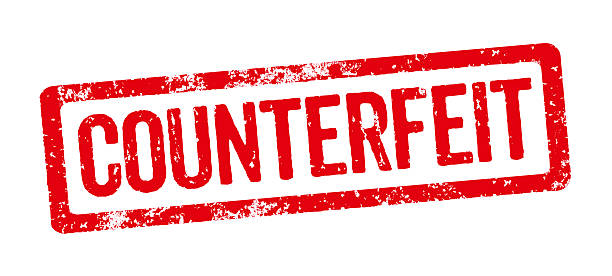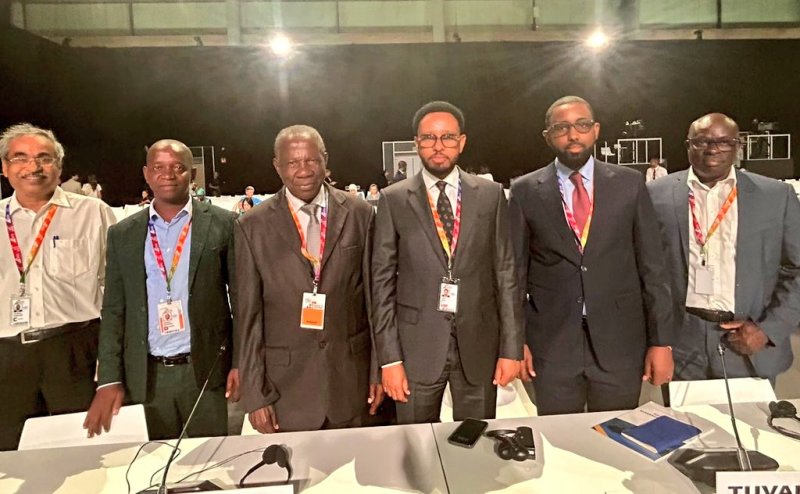How counterfeit products are killing the manufacturing sector and the economy
Counterfeit goods inflict a considerable economic toll on Uganda's industries and businesses. Statistics indicate that local companies lose up to Shs4 billion annually to trade in fake goods.

Counterfeit goods have become a pervasive issue in Uganda, with far-reaching consequences that permeate various aspects of the country’s social and economic landscape.
Beyond the immediate loss of revenue to legitimate businesses, the effects of counterfeit goods ripple through society, affecting consumers, public health, intellectual property rights, and national security.
Counterfeits, according to a 2017 report by Standard Bank Group, make the government lose about Shs15 billion in taxes annually.
Various product categories are affected by the counterfeit trade, including food items, iron sheets, cosmetics, and building materials like cement, toilet paper, polythene bags, electronics, alcoholic beverages, solar panels, pharmaceuticals, chemicals, and more.
Shockingly, the Uganda National Bureau of Standards (UNBS) reports that approximately 54 percent of the goods available in the market fall into the category of either fake or counterfeit products, significantly raising concerns about their substandard quality and authenticity.
Economic toll on Uganda’s industries
Counterfeit goods inflict a considerable economic toll on Uganda’s industries and businesses. Statistics indicate that local companies lose up to Shs4 billion annually to trade in fake goods.
The influx of counterfeit products, which are often sold at a fraction of the price of legitimate items, directly competes with genuine products in the market.
Consequently, companies experience reduced sales, leading to job losses, decreased investments, and weakened economic growth.
Threat to public health
One of the most alarming consequences of counterfeit goods is the severe threat they pose to public health and safety. In the pharmaceutical sector, counterfeit medicines can be ineffective or, worse, harmful to consumers.
The circulation of counterfeit drugs not only threatens the lives of those who consume them but can also contribute to the development of drug-resistant strains of diseases. Additionally, counterfeit food and beverages can lead to foodborne illnesses and other health hazards.
Devilish love for money
According to Dr Ronett Atukunda, Head of the Department of Economics at Makerere University Business School (MUBS), the love for money has influenced the rise of counterfeits on the market.
“The love for money I believe pushes away humanity so that somebody will not mind manufacturing counterfeits. People will get sugar and mix it with iron filings to make a kilogram and they will not care what will happen to your appendix. At times they say it is poverty but they are supposed to have a level below which they should never fall regardless.” she says.
She reveals that economic development looks at how you grow in terms of money but also at the welfare of the people.
“There is no way Uganda will be said to be a medium-income country when people are still dying. The country has been growing at 6%. It would have reached these other middle-income countries but these other indicators are failing,” she notes.
Expect more counterfeits
Dr Atukunda explains that the growth of counterfeits will increase because GDP measures how much a country produces.
“GDP only measures how much has been produced without distinctions of original or fake goods. Now that the conversation is getting louder, I believe we need to put an eye there.” She says.
She also agrees that goods have flooded the market but most of them are fakes.
“Counterfeiting is a sophisticated level of theft that we need to all come out and condemn. By buying counterfeits, we are killing ourselves especially when you are buying it because you think it is cheap since cheap things turn out to be expensive,”
Uganda’s struggle with counterfeit goods can dissuade foreign investors from entering the market. Investors may perceive the lack of effective enforcement against counterfeiting as indicative of a weak legal and regulatory environment, dissuading foreign capital and expertise from contributing to economic development.
What the law says
In July 2023, the Anti-Counterfeiting Bill, 2023 was tabled. The Bill was first introduced in 2015 but the Cabinet withdrew it on grounds that other laws address counterfeiting goods.
The various laws that the Government cited to regulate the registration and exploitation of intellectual property assets include; the Copyright and Neighbouring Rights Act, 2006, the Trade Secrets Protection Act, 2009, the Trademarks Act, 20l0, the Geographical Indications, Act, 2013, the Industrial Property Act, 2014, and the Plant Variety and Protection Act, 2014.
The proposed Bill will prohibit trade in counterfeit goods that infringe upon protected intellectual property rights require intellectual property rights to cover only copyrights and trademarks and prohibit the sale of counterfeit goods.
It will also create offences relating to trade in counterfeit goods, empower the Commissioner General of the Uganda Revenue Authority to confiscate suspected counterfeit goods and allow inspectors appointed by the Uganda National Bureau of Standards to do the same.
UNBS has a crucial mandate focused on safeguarding public health, safety, and the environment by regulating against hazardous, counterfeit, and substandard products. Furthermore, UNBS plays a pivotal role in fostering equitable trade practices and maintaining industry precision by establishing dependable measurement systems.
In addition to these responsibilities, UNBS actively contributes to the enhancement of Uganda’s economic prowess by bolstering the competitiveness of domestic industries and promoting the export of high-quality products through rigorous standardization efforts.
What should be done?
In 2020, the Anti-Counterfeit Network (ACN), in cooperation with QG Group, initiated the “League of the Genuine” (LOG) partnership. This collaborative endeavour aimed to raise awareness among consumers and decision-makers about the hidden perils of counterfeit products while providing support to stakeholders in safeguarding against the significant economic and social consequences associated with fake goods.
Richard Kawesa, the Director of Strategy at the ACN further noted that the complex dynamics that drive the prevalence of counterfeits in Uganda require collective, coordinated, and sustained interventions and not individual effort.
“That is why the LOG partnership encourages the public, brands, organizations, law enforcement agencies, and policymakers to join forces behind the LOG and work closely to expose counterfeit perpetrators, advocate for the dangers of counterfeits or substandard products and develop and implement policies to safeguard genuine products,” said Kawesa.
“With our partner, we have developed a multifaceted strategy to address all the driving features of counterfeit culture such as consumer ignorance, inability to distinguish between genuine and fake goods, dangers of counterfeiting, psychosocial factors in terms of mindset or behaviour, and the lack of adequate cooperation or support from key stakeholders.”
David Galukande, the Managing Director of QG, emphasized that the LOG partnership is poised to create a platform for raising awareness. Its primary objective is to ensure that the public gains a comprehensive understanding of the profound social, health, and economic consequences linked to counterfeiting.
Galukande asserted that effectively tackling counterfeiters necessitates a united and coordinated effort involving all stakeholders.
“This can be done by addressing legislative, regulatory, enforcement, technological, and communication gaps. This calls for the unrelenting commitment of not only the government and its agencies but also industries, manufacturers, citizens, and other stakeholders to join the fight and tackle the problem of counterfeits that – if unsolved – can destroy both lives and businesses.” he said.







